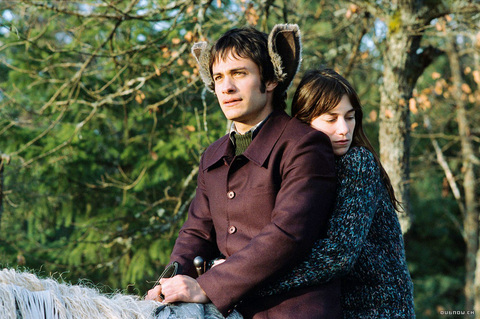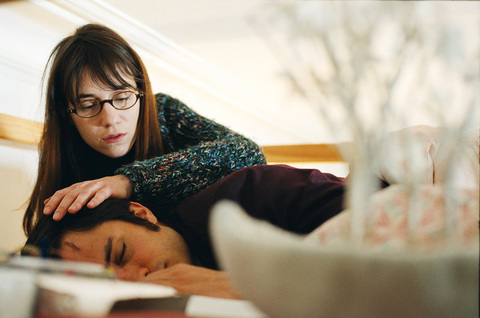The Science of Sleep, Michel Gondry's beguiling new film, is so profoundly idiosyncratic, and so confident in its oddity, that any attempt to describe it is bound to be misleading. While points of comparison are available — to Human Nature and Eternal Sunshine of the Spotless Mind, Gondry's collaborations with Charlie Kaufman; to early Surrealist artworks or the later films of Luis Bunuel — they don't do much to illuminate the puzzling, mostly delightful experience of watching The Science of Sleep unfold.
So it may be best to tack in the opposite direction, with a description that is no less accurate for seeming completely illogical. What I'm trying to say is that The Science of Sleep, for all its blithe disregard of the laws of physics, film grammar and narrative coherence, strikes me as perfectly realistic, as authentic a slice of life as I've encountered on screen in quite some time.
Some immediate qualification is called for, since the life that Gondry explores, in a spirit at once rigorous and playful, is the inner life of an eccentric, somewhat troubled fellow. Filmed in not-especially-glamorous parts of Paris, the film takes place in a zone where dreams, wishes and fears mingle with, and at times obliterate, the literal facts of everyday existence.

Beginning deep inside the head of its hero, an anxious young man named Stephane (Gael Garcia Bernal), The Science of Sleep creates a world of intense peculiarity, where time seems to move in loops and curlicues, and where the basic axiom that a thing and its opposite can't both be true seems not to apply.
Plot summary, therefore, is both irrelevant and impossible. Which is not to say that the movie lacks a story, only that, like a dream, the narrative moves sideways as well as forward, revising and contradicting itself as it goes along. Gondry, who would rather invent than explain, makes a plausible case that a love story (which is what The Science of Sleep is) cannot really be told any other way. Love is too bound up with memories, fantasies, projections and misperceptions to conform to a conventional, linear structure.
Arriving in Paris from Mexico to stay with his mother (Miou-Miou), Stephane stumbles into a stop-and-go romance with Stephanie (Charlotte Gainsbourg), a skittish neighbor. Actually, what happens is that her piano falls on him, a bit of cartoon slapstick that Gondry stages with insouciant matter-of-factness. Stephane's eye is first caught by Stephanie's friend Zoe (Emma de Caunes), who is more conventionally pretty but lacks Stephanie's charming strangeness. Still, the initial confusion over the two women is not so easily dispelled, and even before it begins, Stephanie and Stephane's relationship is shadowed by doubt, jealousy and confusion.

Bernal and Gainsbourg resemble a pair of fine-boned, exotic birds, exchanging tentative mating calls in their differently accented English (his tinged with Spanish, hers an eerily perfect echo of her mother, the British actress Jane Birkin).
Their awkward flirtation is also an artistic collaboration. Stephane, an aspiring illustrator (whose mother has found him a job working for a calendar company), also tinkers with improbable gadgets, like a one-second time machine made from a rewired old toy. For her part, Stephanie fashions dioramas out of felt and old stuffed animals.
And Gondry, who sharpened his eye making commercials and music videos, is a kindred spirit. He forgoes computerized special effects in favor of stop-motion animation and papier-mache, finding magical possibilities in homely materials and ordinary situations. Stephane's job, for instance, is a familiar nightmare of daily drudgery with annoying colleagues (including the spectacularly obnoxious Guy, played by Alain Chabat), but also a source of perpetual surprise and, for the audience, comic enchantment.
Gondry's debt to Surrealism lies in his embrace of the notion that the unconscious is a kingdom governed by its own perverse logic, beyond the control of reason. His vision of the unconscious, however, is remarkably benign. The dream world of The Science of Sleep is not haunted by primal sexual terror or constructed for purposes of social criticism, the way Bunuel's landscapes were. It has, instead, a wide-eyed, picture-book quality, an air of almost aggressive innocence.
After a while, the spell wears off. Not because the film's inventiveness wanes, but because its mood changes, slowly but noticeably, from eager enthrallment to desperation. The gray of daylight seeps in around the edges, and Stephane's dreams become less an escape from the frustrations of ordinary life than another potential source of disappointment. His childlike behavior, especially around Stephanie, begins to seem intemperate and regressive, a petulant refusal to wake up into the rational, adult world.
And so you leave this buoyant, impish movie feeling a little blue: sorry that it had to end and also wishing, perhaps, that it amounted to more. But its fugitive, ephemeral quality is part of its point: dreams, after all, are hard to remember, and perhaps don't hold the meanings they seem to. Without them, though, our minds would be emptier and our lives much smaller. So while The Science of Sleep may not, in the end, be terribly deep, it is undoubtedly — and deeply — refreshing.

Even by the standards of Ukraine’s International Legion, which comprises volunteers from over 55 countries, Han has an unusual backstory. Born in Taichung, he grew up in Costa Rica — then one of Taiwan’s diplomatic allies — where a relative worked for the embassy. After attending an American international high school in San Jose, Costa Rica’s capital, Han — who prefers to use only his given name for OPSEC (operations security) reasons — moved to the US in his teens. He attended Penn State University before returning to Taiwan to work in the semiconductor industry in Kaohsiung, where he

On May 2, Chinese Nationalist Party (KMT) Chairman Eric Chu (朱立倫), at a meeting in support of Taipei city councilors at party headquarters, compared President William Lai (賴清德) to Hitler. Chu claimed that unlike any other democracy worldwide in history, no other leader was rooting out opposing parties like Lai and the Democratic Progressive Party (DPP). That his statements are wildly inaccurate was not the point. It was a rallying cry, not a history lesson. This was intentional to provoke the international diplomatic community into a response, which was promptly provided. Both the German and Israeli offices issued statements on Facebook

May 18 to May 24 Pastor Yang Hsu’s (楊煦) congregation was shocked upon seeing the land he chose to build his orphanage. It was surrounded by mountains on three sides, and the only way to access it was to cross a river by foot. The soil was poor due to runoff, and large rocks strewn across the plot prevented much from growing. In addition, there was no running water or electricity. But it was all Yang could afford. He and his Indigenous Atayal wife Lin Feng-ying (林鳳英) had already been caring for 24 orphans in their home, and they were in

Australia’s ABC last week published a piece on the recall campaign. The article emphasized the divisions in Taiwanese society and blamed the recall for worsening them. It quotes a supporter of the Taiwan People’s Party (TPP) as saying “I’m 43 years old, born and raised here, and I’ve never seen the country this divided in my entire life.” Apparently, as an adult, she slept through the post-election violence in 2000 and 2004 by the Chinese Nationalist Party (KMT), the veiled coup threats by the military when Chen Shui-bian (陳水扁) became president, the 2006 Red Shirt protests against him ginned up by